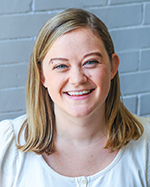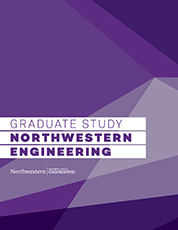Discovering a Creative Confidence
Paige Hendersen (EDI ‘22) talks about how her mindset and skill sets shifted during her time in the EDI program and how that prepared her to become a design researcher at Sylver Consulting.
Paige Hendersen (EDI '22) came to Northwestern's Master of Science in Engineering Design Innovation (EDI) program with a degree in mechanical engineering. Now she is a design researcher who's supported clients across healthcare, technology, insurance, and consumer products to solve complex product, service, and customer experience challenges.
That transformation would not have happened without EDI.
 "I’ve gained confidence in truly implementing the skillsets I learned and practiced within my EDI courses," said Hendersen, who has worked at Chicago-based Sylver Consulting since graduating. "I now see myself as a designer, researcher, and strategist, not just an engineer."
"I’ve gained confidence in truly implementing the skillsets I learned and practiced within my EDI courses," said Hendersen, who has worked at Chicago-based Sylver Consulting since graduating. "I now see myself as a designer, researcher, and strategist, not just an engineer."
Hendersen was looking to deepen her human-centered design skillset when she came to Northwestern while broadening her work with digital products, services, and customer experiences.
EDI did that — and more.
"EDI allows students to dive right into a project and take leadership and ownership wherever they want to explore," she said. "It's really the project-based learning that prepares students for real world experiences."
Hendersen has flourished in her first year since graduating from the EDI program, becoming a key player at Sylver Consulting. As a design researcher, she routinely conducts in-depth stakeholder interviews, analyzes qualitative and quantitative data, writes client reports, contributes to Sylver's thought leadership on social platforms, and facilitates client workshops.
She sees herself working at the intersection of feasibility, viability, and desirability for client initiatives — an intersection that can often be filled with ambiguity and uncertainty. It's in that uncertainty where Hendersen thrives.
Hendersen, like each employee on the Sylver website, has a superpower listed in their bio. Not surprisingly, her superpower is curiosity.
"Having curiosity is so important because I believe the most effective researchers fall in love with the problem, and not the solution," she said. "Leaning into my innate curiosity for how things work and how people feel is so important and pairs with building empathy for the audience I'm designing for."
To succeed, she relies not only on the hard skills developed in EDI like discussion guide development, interviewing techniques, insight generation, and visual frameworks, but also the soft skills that help her thrive with client management, communication, and facilitation.
Hendersen has experienced the transformative power of the EDI program, which is why she is now a vocal advocate for the program. She routinely talks with prospective students and recommends they reflect on their goals heading into the program and where they want to be when they graduate.
She also ensures they understand how unique and valuable the EDI experience can be for their growth.
“In the EDI program, you are growing and flexing new skillsets through learning-by-doing in a project-based curriculum," she said. "You are assessed by your growth, how you achieve your goals and client goals, and your ability to overcome failure. This is amazingly effective and needs to be encouraged even more in higher-education models.”

